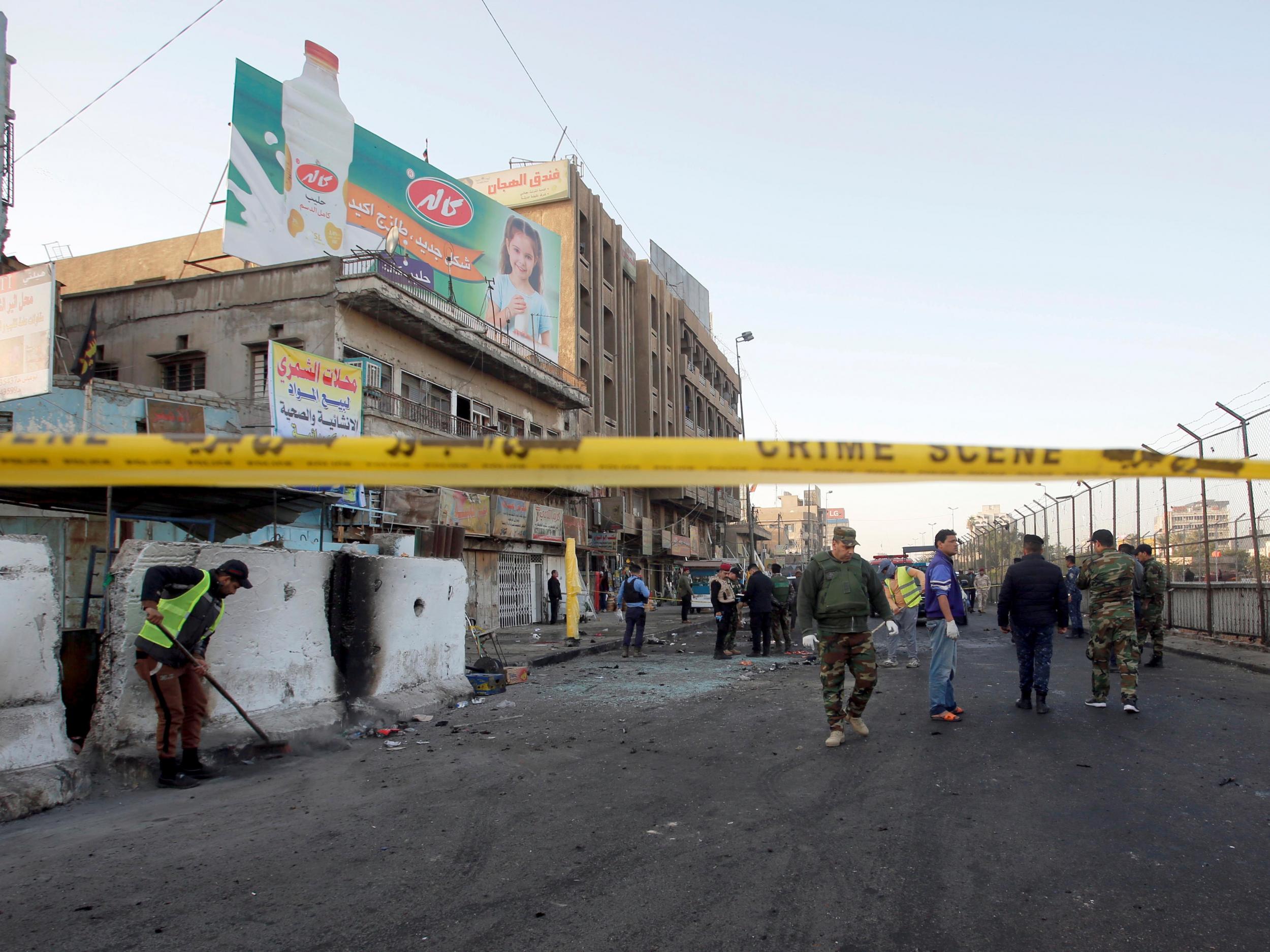Baghdad suicide attacks: ‘Back-to-back’ explosions in Iraqi capital leave at least 38 dead and 105 injured
Attackers struck during rush hour in the city’s Tayran Square, usually crowded with labourers seeking work

Your support helps us to tell the story
From reproductive rights to climate change to Big Tech, The Independent is on the ground when the story is developing. Whether it's investigating the financials of Elon Musk's pro-Trump PAC or producing our latest documentary, 'The A Word', which shines a light on the American women fighting for reproductive rights, we know how important it is to parse out the facts from the messaging.
At such a critical moment in US history, we need reporters on the ground. Your donation allows us to keep sending journalists to speak to both sides of the story.
The Independent is trusted by Americans across the entire political spectrum. And unlike many other quality news outlets, we choose not to lock Americans out of our reporting and analysis with paywalls. We believe quality journalism should be available to everyone, paid for by those who can afford it.
Your support makes all the difference.Two suicide bombers blew themselves up at a busy street market in central Baghdad on Monday, in back-to-back explosions that killed at least 38 people, Iraqi health and police officials said.
The attackers struck during rush hour in the city’s Tayran Square, which is usually crowded with labourers seeking work.
The twin explosions also wounded at least 105 people, officials said, speaking on condition of anonymity as they were not authorised to talk to the media.
Earlier reports by spokesmen from the Health Ministry and the Interior Ministry said 26 people had been killed in the first explosion, with at least 16 dead from the second blast – and dozens wounded.
Ambulances rushed to the scene as security forces sealed off the area with yellow tape. Slippers could be seen scattered about on the bloodstained pavement as cleaners hurried to clear the debris. Photographs posted on social media showed lifeless bodies and pieces of limbs.
No group immediately claimed responsibility for the attack but it bore all the hallmarks of the Islamic State group, which has claimed responsibility for many such attacks in the past.
“I felt the ground shaking under my feet,” said Munthir Falah, a secondhand clothes vendor whose chest and right leg were pierced by shrapnel. He said he fell to the ground and lost consciousness before later waking up in a hospital.
The father of three said government forces had failed to secure the capital. “They think that Daesh is done,” he said, referring to IS by an Arabic acronym. “They don’t bother themselves to exert efforts to secure Baghdad.”
Einas Khalil, a Baghdad housewife, blamed the security breakdown on the country’s feuding politicians, many of whom are connected to different state-sanctioned militias, or branches of the security forces.
“We were expecting this because of the upcoming elections,” she said. “Every four years we have to live through this suffering because of political differences and disagreements.”
Iraqi parliament Speaker Salim al-Jabouri denounced the attack as a “cowardly act against innocent people” and called on the government to take all necessary security measures.
Iraqi Prime Minister Haider al-Abadi met security officials in charge of Baghdad, ordering them to root out militant sleeper cells, according to a brief statement issued by his office.
The twin explosions shocked residents in the Iraqi capital because large attacks had decreased significantly in Baghdad and other parts of country since security forces retook nearly all territory once held by IS militants.
A deterioration in security could undermine al-Abadi’s claim to have vanquished IS and create an opening for his main rival, former Prime Minister Nouri al-Maliki, to return to power in national elections expected to be held in May.
Iraqi and US officials have warned that IS would continue with insurgent-style attacks even after the Iraqi military and US-led coalition succeeded in uprooting the Islamic State group across the country.
The cost of victory has been nearly incalculable as the three years of war against IS devastated much of northern and western Iraq – roughly a third of the country – where Islamic State militants had held most of the territory.
AP
Join our commenting forum
Join thought-provoking conversations, follow other Independent readers and see their replies
Comments